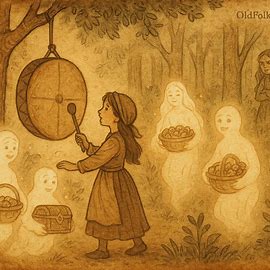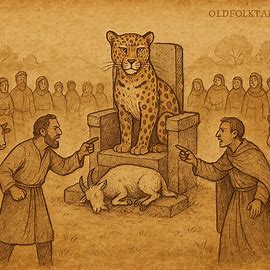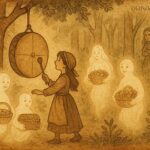I often tell the story of Nga Nzua, son of Kinoueza kia Tumb’a Ndala. When his father died, and soon after his mother too, he was left with only his younger sister, Fenda Maria. Their mother, before passing, entrusted Fenda Maria with a small goat, saying: “My daughter, this goat is your mother, this goat is your father. Care for it, for in it lives our memory.” After her burial, the two siblings lived together, sharing modest meals, bagre in the morning and catfish at night.
As years passed, Fenda Maria looked to her brother and said, “Elder mine, others around us marry. Why do you not take a wife? Our parents left us wealth, and I, being a woman, cannot manage it alone. If you marry, it will gladden me.” But Nga Nzua silenced her: “Hold your peace, Nga Maria.” And so, she kept quiet.
One day, dressed finely, Nga Nzua traveled to Loanda. There he encountered Nga Nzuana, daughter of the Governor of Angola. She gazed at him in awe: “Never since I was born have, I seen a man as handsome as Nga Nzua, son of Kinoueza kia Tumb’a Ndala.”
When he returned home, Nga Nzua told his sister of his encounter. “Nga Nzuana pleased me greatly. But she said, ‘If you would marry me, your sister Fenda Maria must become my slave, given as part of the wooing-presents.’ I do not know what to do.” His sister answered with silence, though sorrow filled her heart.
READ THIS: Ngana Fenda Maria and the Betrayal of Kamasoxi: Angolan Folktale of Truth and Sacrifice.
The next morning, he resolved: “I will fetch her at once!” He gathered the wooing gifts, went to Loanda, and sought the Governor’s permission. The Governor agreed: “My daughter shall marry Nga Nzua, though I take no payment.” They wed in church, celebrated for two days, and returned to Nga Nzua’s home.
There, Nga Nzuana looked upon Fenda Maria and declared, “Once you were Ngana Fenda Maria. Now you are Kamaria, my slave.” From then on, Fenda Maria fetched water, gathered firewood, and washed clothes.
At the riverside, weeping beneath a fig tree, she cried, “Woe is me! Born to freedom, yet today made a slave.” Her goat appeared, bleating softly, “Mistress mine, why do you weep?” She replied, “Never have I washed like a slave girl, but now my parents are gone, and my brother’s wife commands me.” The goat comforted her: “Be still, young mistress. One day you shall see your glory. For now, let me help.” And the goat washed the garments, folded them neatly, and returned them to her.
Time passed, and Nga Nzuana bore a son. The child grew, learned letters, and one day, at his father’s table, refused every dish until he declared, “I want goat.” Pressed further, he added, “I want Kamaria’s goat.” They slaughtered it and handed the entrails to Kamaria to clean. But each tripe she rinsed was carried off by fish until all were gone. She wept bitterly, and when even the washing tub drifted away, she despaired and fled into the forest.
There she found an old woman of Kinoueza kia Tumb’a Ndala, who suffered from leprosy. Fenda Maria nursed her tenderly. Grateful, the woman opened storerooms overflowing with wealth, cloth, copper, wax, ivory, indiarubber, rum and gave her chests filled with treasures: cloth, soldiers, mules, slaves, music, money, and gowns.
Carrying these, Fenda Maria journeyed to the land of the Ma-kishi of Lumba. By fate, the chief’s son Ndunge had been born the same day as Fenda Maria. Welcomed joyfully, she was given fine beds, servants, and honoured with dances through the night. Yet her heart longed for home and her brother. After much urging, she departed with gifts of food, clothes, music, and more.
When she returned, Nga Nzuana mocked her: “Kamaria! Lost so long, now you appear?” She was beaten and scorned. Yet on Sunday, when they prepared for church, Fenda Maria secretly struck her chests upon the ground. Out came splendid dresses, carriages, soldiers, music, and servants. She entered the church with unmatched beauty, and all, both white and black, marvelled: “Never have we seen a lady so radiant.”
The Governor proclaimed: “Whoever reveals this lady to me, even by a shoe, shall be rewarded.” The truth could not remain hidden. Fenda Maria was revealed before the Governor himself. Questioned, she said, “Once I was his sister, but now I am made a slave.” The Governor summoned Nga Nzua and heard the matter.
At last, justice was restored. Nga Nzua was disgraced for betraying his sister’s dignity. Fenda Maria, with her wealth and honour restored, raised for her brother a fine house, filled it with servants, cattle, and riches, and gave him a life of comfort. Yet she remained the stronger, for she had endured sorrow and reclaimed her worth.
And so, they lived, sharing meals of i-kusu and catfish, while her story became a lesson for generations.
Moral Lesson
This folktale teaches that betrayal may wound deeply, but truth and resilience restore dignity. Fenda Maria endured silence, hardship, and humiliation, yet through patience, kindness, and hidden strength, she regained her rightful place. It warns that selfishness and cruelty bring shame, while compassion and endurance lead to honour.
Knowledge Check
Q1: Who were the children of Kinoueza kia Tumb’a Ndala?
Nga Nzua and his younger sister Fenda Maria.
Q2: What did their mother leave to Fenda Maria before dying?
A goat, symbolizing both her mother and father.
Q3: Why did Nga Nzuana demand Fenda Maria as a slave?
She required it as a condition for marrying Nga Nzua.
Q4: How did the goat help Fenda Maria?
It washed clothes for her and promised she would see her glory.
Q5: What treasures did the old woman of Kinoueza kia Tumb’a Ndala give her?
Chests filled with cloth, rum, ivory, money, slaves, soldiers, mules, music, and gowns.
Q6: What central lesson does the story teach?
That betrayal leads to shame, but patience and resilience restore justice.
Source: Traditional folktale from Angola’s Kimbundu people.







